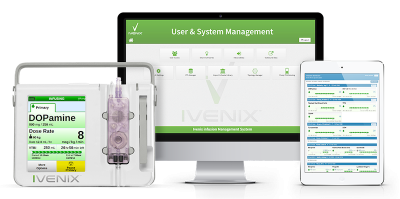For the third time since 2022, when it purchased infusion pump maker Ivenix for $240 million, Fresenius Kabi has earned a Class I rating from the FDA for a recall of the Ivenix medication delivery technology.
The latest recall—like its predecessor last spring—concerns the large-volume pump component of the Ivenix infusion system, which also comprises a pump management software platform and a digital clinician dashboard.
The pump is used to automate the delivery via IV of blood, medications and other fluids to patients in hospitals and other clinical settings.
This time around, according to an FDA notice issued Friday, Fresenius Kabi initiated the recall after discovering issues with the fluid valve pins located inside the pumps. In some cases, mechanical issues could stop the pins from moving properly, forcing them instead to collide with nearby sensors. When that happens, an alarm is triggered, automatically stopping the pump from any infusions in progress or preventing the system from starting up properly.

A stopped or delayed infusion, in turn, could lead to serious harm or death, per the FDA, if patients aren’t able to receive possibly life-sustaining fluids in a timely manner. So far, however, the company has yet to receive any such reports of injury or death associated with the issue.
Fresenius Kabi began the recall at the end of November. It covers only LVP-0004 models of the large-volume pump that were distributed between October 2021 and July of last year—938 of which were sold in the U.S., according to the FDA.
In an urgent letter sent to affected customers when the recall began, the devicemaker suggested that they keep a close eye on the pumps when they’re being used to deliver life-sustaining medications and, if a “Pump Problem” alarm goes off either during setup or mid-infusion, to immediately switch to a different pump and remove the affected pump from use.
Fresenius Kabi said its service representatives would begin contacting customers this month to “create a plan” to address any of their pumps impacted by the mechanical issues.
The company’s previous Class I recall centered on the same model of the large-volume pumps and began last March. In that case, Fresenius Kabi alerted customers after identifying a leak in the system that could allow fluids to flow into the pump itself, damaging the electrical system and causing a sensor to fail. According to the FDA’s notice at the time, the issue had spawned a total of 14 complaints, with no reports of injuries or deaths.
Before that, in late 2022, Fresenius Kabi earned yet another Class I tag for a recall of its then-newly acquired infusion system. That recall specifically concerned the pump’s software, as the display screens were found to be at risk of freezing, ignoring any input from users and temporarily stopping any infusions in progress—though the issue was confined to just four instances, according to its entry in the FDA’s recall database.